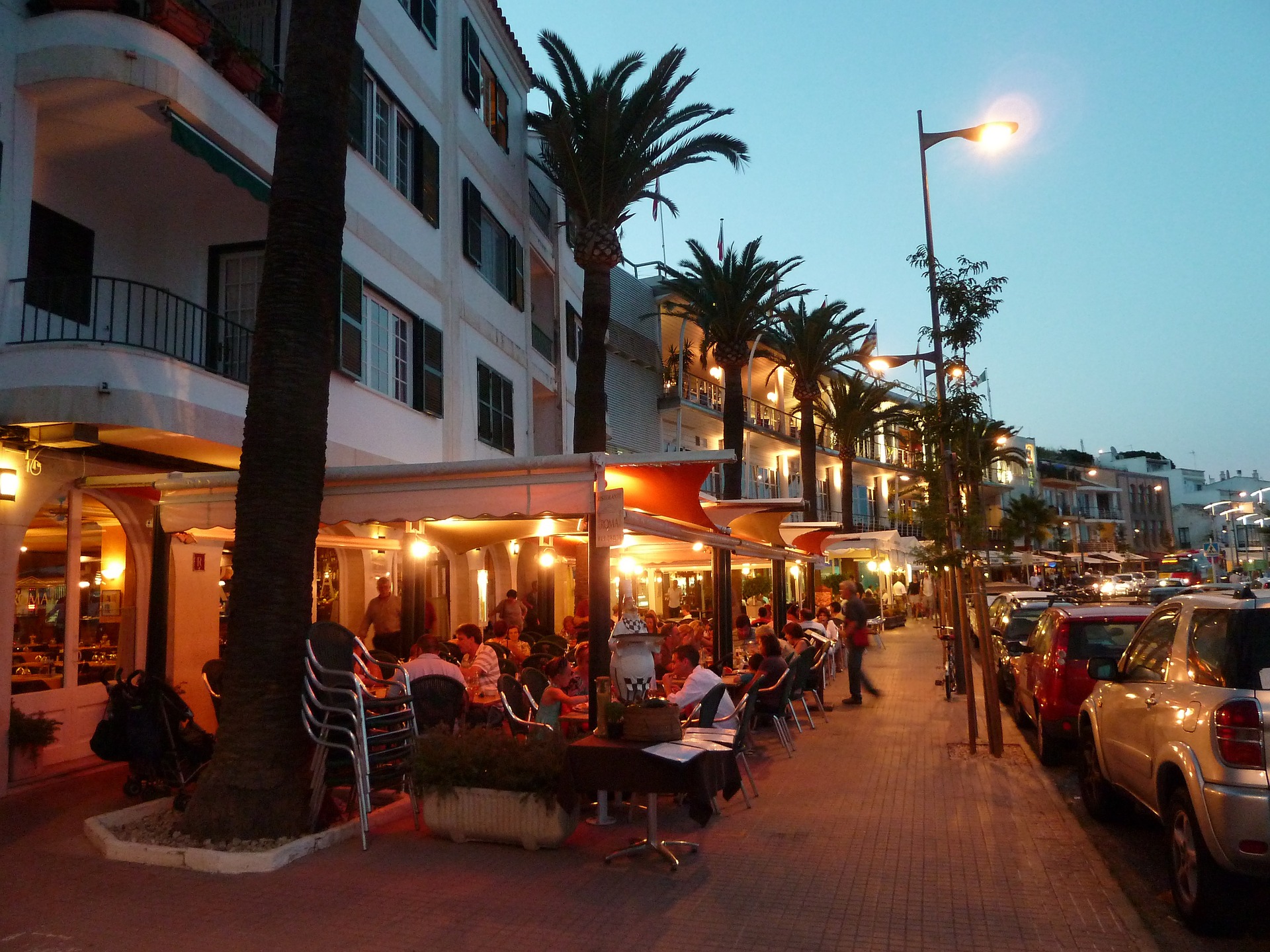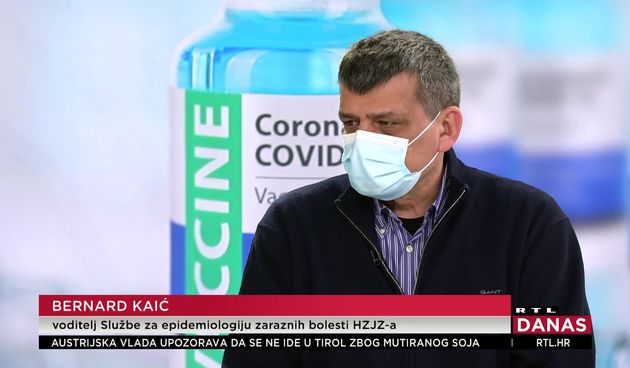Croatia's Coronavirus Update: 667 New Cases, 9 Deaths, 422 Recoveries
ZAGREB, 4 March, 2021 - In the last 24 hours, Croatia has conducted 6,965 coronavirus tests, and 667, that is 9.58%, have returned positive, the country's COVID-19 crisis management team reported on Thursday.
In the said period, there have been nine deaths linked to COVID-19, bringing the death toll to 5,564.
Currently, Croatia has 3,558 active cases, of whom 740 are hospitalised patients, including 69 COVID patients placed on ventilators.
Since 25 February 2020, when Croatia recorded its first case of infection with coronavirus, 1,368,448 tests have been performed, showing that 244,872 people have contracted the virus. Of them, 235,750 have recovered, including 422 in the last 24 hours.
There are now 14,456 people self-isolating in the country.
Croatia Registers 520 New Coronavirus Cases, Eight Deaths
ZAGREB, 27 February, 2021 - In the past 24 hours 520 new coronavirus cases and eight COVID-19 deaths have been registered in Croatia, the national COVID-19 response team said on Saturday.
There are 3,126 active cases, including 760 hospitalised patients, 75 of whom are on ventilators, while 14,442 people are self-isolating.
To date 1,338,842 people have been tested for the virus, including 6,002 in the past 24 hours.
Since 25 February 2020, when the first case was registered in Croatia, 242,617 cases of infection have been registered, including 5,511 deaths and 233,890 recoveries, 342 of which in the past 24 hours.
Croatia Logs 505 New Coronavirus Cases, 14 Deaths
ZAGREB, 26 February, 2021 - In the past 24 hours Croatia has confirmed 505 new cases of coronavirus and 14 related deaths, the national COVID response team said on Friday.
There are currently 3,046 active cases in the country, including 780 hospitalised patients, 73 of whom are on ventilators, while 13,534 people are in self-isolation.
To date, a total of 1,332,840 people have been tested for the virus, including 5,071 in the past 24 hours.
Since 25 February 2020, when the first case was identified in Croatia, there have been 242,097 registered cases of coronavirus and 5,503 COVID-related deaths.
A total of 233,548 people have recovered from the disease, 378 of whom in the past 24 hours.
Croatia Reports 544 New COVID-19 Cases, 12 Fatalities
ZAGREB, 25 February, 2021 - In the past 24 hours 544 new coronavirus cases have been registered in Croatia and 12 COVID-19 patients have died, the national COVID response team said on Thursday.
Currently there are 2,933 active cases, including 790 hospitalised patients, of whom 70 are on ventilators.
A total of 12,869 people are self-isolating.
To date 1,327,769 people have been tested for the virus, including 6,433 in the past 24 hours.
Since 25 February 2020, when the new virus was first registered in Croatia, 241,592 people have been infected, of whom 5,489 have died.
A total of 233,170 people have recovered, including 278 in the past 24 hours.
Croatia Reports 431 New Coronavirus Cases, 13 Deaths
ZAGREB, 20 February, 2021 - Croatia has recorded 431 new coronavirus cases and 13 related deaths in the last 24 hours, the national coronavirus response team reported on Saturday morning.
The number of active cases currently stands at 2,421. Among them are 782 infected people receiving hospital treatment, 78 of whom are on ventilators.
A total of 12,001 people are currently in self-isolation.
So far, a total of 1,298,994 people have been tested, including 5,579 in the last 24 hours.
Since 25 February 2020, when the first coronavirus case was confirmed in Croatia, 239,685 people have contracted the novel virus, of whom 5,420 have died.
A total of 231,844 have recovered, including 310 in the last 24 hours.
Croatia Reports 388 New Coronavirus Cases, Eight Deaths
ZAGREB, 19 February, 2021 - Croatia has recorded 388 new coronavirus cases and eight related deaths in the last 24 hours, the national coronavirus response team reported on Friday morning.
The number of active cases currently stands at 2,313. Among them are 798 infected people receiving hospital treatment, 73 of whom are on ventilators.
A total of 11,725 people are currently in self-isolation.
Since 25 February 2020, when the first coronavirus case was confirmed in Croatia, 239,254 people have contracted the novel virus, of whom 5,407 have died and 231,534 have recovered, including 358 in the last 24 hours.
A total of 1,293,415 people have been tested to date, including 4,986 in the last 24 hours.
Index: Cafe Terraces Open In Two Weeks If Numbers Stay Low
February 17, 2021 – Indoor sports return and cafe terraces open on Monday 1st March if infection numbers remain low, learns Croatian media outlet Index.
By the time spring arrives, Croatian coffee lovers should be back enjoying their drinks outside their favourite cafe bar. Cafe terraces open on Monday 1st March 2021 if Coronavirus infection numbers remain low and stay on their current trajectory, according to Croatia media outlet Index.
Indoor sports will also return on the same date, with the same stipulation that infection numbers remain low. Having cafe terraces open again cannot come too soon for frustrated business owners. At the moment, they are only permitted to serve coffee to go. According to Index, from on Monday 1st March 2021, cafe terraces open and people will no longer need to congregate on the street outside, in parks or on benches to enjoy their drinks.
“Measures should be further relaxed throughout Croatia as of March 1, including the much-anticipated opening of cafe terraces,” says the portal. Cafe terraces open and other relaxed measures depend on the prerequisite of figures remaining at the level they are at now. “The share of newly infected in the number tested in recent days is below five percent,” Index adds.
Headquarters and the government had already announced that the next round of concessions could be expected in early March. Cafe terraces open in Croatia from March 1st 2021, if Coronavirus numbers remain low, say media outlet Index
Cafe terraces open in Croatia from March 1st 2021, if Coronavirus numbers remain low, say media outlet Index
Croatian cafe terraces open, the interior of cafes and restaurants remain closed
“As we find out, the terraces of cafes and restaurants will definitely open on March 1,” wrote Index. “However, according to information from a source close to the Headquarters, the closed (interior) parts of cafes and restaurants will not be opened. (This) is realistically expected in April at the earliest.”
“Once cafe terraces open, guests will most likely not be able to enter the interiors of cafes and restaurants, except perhaps for the use of toilets, to prevent indoor parts of cafes and restaurants from being used and guests being served there. Closed spaces are still considered by headquarters (to be) an extremely high risk when it comes to the spread of coronavirus.”
Further relaxation of Coronavirus measures: Indoor sports to return
According to Index, although the first information received said that from March 1, only indoor sports for children would be opened, the portal has discovered that instead all indoor sports should be opened, with prescribed epidemiological measures. They remind that, according to current measures, only gyms, swimming pools and contactless individual ball sports are allowed.
Public gatherings / marketplaces / fairs
“There should be concessions when it comes to fairs, but it is not yet completely clear under what conditions,” says the portal. Like supermarkets, open-air and indoor markets are currently permitted to operate. The newly relaxed measures will pertain to similar, but more irregular events at which arts & crafts, books and other goods are on display for sale. The portal say that the vending and consumption of food – which is traditional at such events – will likely not be permitted for now.
“The headquarters is inclined to open fairs where products are sold or exhibited, but the consumption of food and drinks might be limited to prevent excessive gatherings and socializing,” they say.
Relaxation of Coronavirus measures pertaining to private gatherings
“The allowed number of people at various gatherings should not change significantly, only minor corrections are possible,” claims the portal, adding that the current ban on the gathering of people from more than two households may instead be downgraded to a recommendation. The portal reminds that this measure has not been strictly enforced in any way before.
"To give way on March 1, the numbers have to stay at about the level they are now. But the pressure is great - no one wants to keep something closed that should not be kept closed. Most of it is already open, so there remains a narrow circle of what can still be given,” a source close to the Headquarters is quoted as telling Index.
Friction between regional and national authorities over easing of Covid-19 measures
Even if cafe terrace open on March 1st, Index concludes their article by reminding that a disparity between regional and national authorities is still causing some friction. The friction between two north-westerly regions of the country and national headquarters is specifically addressed.
“The Headquarters believes that the announcement of the Istrian Headquarters that they will open the terraces of cafes and restaurants on March 1 was very incorrect. They (national headquarters) say that this opening is planned at the level of the whole of Croatia anyway.”
“However, the decision of the Primorje-Gorski Kotar headquarters, which postponed the opening of bookmakers and casinos in that county, is perhaps even more critically commented on. The government states that the opening of bookmakers (betting shops) and casinos is a purely financial decision and ironically comments that if the Primorje-Gorski Kotar County wants to leave these facilities closed, they should (themselves) cover the costs that will be incurred,” says the Index article.
Index claims that these moves from Istria and Rijeka (Primorje-Gorski Kotar) are regarded in the National Headquarters and the government as politicking and that they are connected with the upcoming local elections.
For the latest travel info, bookmark our main travel info article, which is updated daily.
Read the Croatian Travel Update in your language - now available in 24 languages
Croatia Logs 379 New Coronavirus Cases, 17 Dead
ZAGREB, 13 February, 2021 - In the past 24 hours 379 new coronavirus cases and 17 COVID-19 deaths have been registered in Croatia, the national COVID response team said on Saturday.
The number of active cases is 2,451, including 955 hospitalised patients, 89 of whom are on ventilators, while 13,097 people are self-isolating.
Since 25 February 2020, when the first case of the new coronavirus was registered in Croatia, 237,459 people have been infected, 5,299 who have died, and 229,709 who have recovered, including 382 in the past 24 hours.
To date 1,260,970 people have been tested for the virus, including 5,184 in the past 24 hours.
Croatia Registers 376 New Coronavirus Cases, 25 Deaths
ZAGREB, 11 February, 2021 - Over the past 24 hours, Croatia has registered 376 new cases of the coronavirus infection and 25 deaths, the national COVID-19 crisis management team said on Thursday.
The number of active cases stands at 2,550. There are 1,029 COVID patients in hospitals, 88 of whom are on ventilators.
There are currently 13,069 people in self-isolation.
To date, 1,250,855 people have been tested, including 6,340 in the last 24 hours.
Croatia has so far registered 236,709 coronavirus infections, including 5,263 deaths. A total of 228,896 people have recovered, 397 of whom over the past 24 hours.
Epidemiologist: At This Rate, Vaccination Goal Won't Be Met Until Autumn
February 9, 2021 – In a Croatian media TV interview, epidemiologist of the Croatian Institute of Public Health Bernard Kaić yesterday said the plan to vaccinate half of the population by the summer will be delayed. He predicted that if Croatia continues vaccination at its current rate, the goal would not be reached until autumn, possibly late autumn
Epidemiologist of the Croatian Institute of Public Health Bernard Kaić, speaking to Croatian media RTL, told them the plan to vaccinate half of the population by the summer will be delayed. The epidemiologist predicted that if Croatia continues vaccination at its current rate, the goal of vaccinating half of the population within the country will not be completed until autumn, possibly late autumn.
"I can't say (by) exactly how much,” he told RTL, regarding how much delay will occur, “because we still don't know how many vaccines we'll get in March. And (how much) after March we (still) have no idea.”
“If this pace continues, it would take four million doses to vaccinate half the population. We won't achieve that until autumn for sure, and it’s late autumn,” the epidemiologist said.
According to an article in Index, the epidemiologist said that, as things currently stand, there will be three vaccines used in Croatia - AstraZeneca, Moderna and Pfizer / BioNTech. They will be used concurrently, with vaccinations from all three available in Croatia at the same time.
When asked which vaccine he would choose to be vaccinated with, the epidemiologist answered that he did not know and that he was glad that he did not have the opportunity to choose. "There was only one offered so I got vaccinated,” said the epidemiologist. “It would be really hard to decide."
When asked why some states have given up vaccinating those over the age of 65 with the AstraZeneca vaccine, the epidemiologist explained that in currently available results from clinical studies the messenger RNA vaccine had proven to be somewhat more effective in preventing mild forms of Coronavirus than the AstraZeneca vaccine. Some of the vaccines work in different ways. However, the epidemiologist ultimately said that it was expected the AstraZeneca vaccine would prove to be effective, it was just that this had not yet been proven statistically. RTL screenshot
RTL screenshot
Later in the interview, the epidemiologist was asked “Due to skepticism towards AstraZeneca, many associations in (Croatia's) border areas plan to take pensioners to Serbia for vaccination. How smart is it to accept such an arrangement?”
The epidemiologist replied; “My only fear is that such organized trips do not turn into corona-trips so that people do not get infected on the way back and forth and do themselves harm. I would wait.”
The three vaccines for which Croatia is currently expecting deliveries are now not the only vaccines available. Speaking in a discussion on the same evening on another Croatian media outlet, HRT, Zlatko Trobonjača, an immunologist from the Rijeka Clinical Hospital, spoke about the Russian vaccine.
"Our country is obviously following the EU and its decisions,” he said. “The EU has entered into talks with Russia. It can be expected that these talks will continue. It is a quality vaccine, it provides high protection.”
"As for the quality of the vaccine, we can see that it is not harmful and it could be used in our country. The EU is oriented towards Western companies. And now, they (the companies) did not stick to the agreement," Trobonjača said, adding that he would be vaccinated with the first vaccine that was made available to him.


